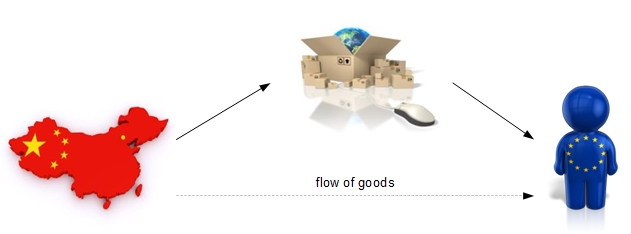1 Background
According to sec. 3 para. 3a sentence 2 of the German VAT Act (Art. 14a para 1 of the EU VAT Directive), a deemed reseller model between an online trader, an online marketplace and a customer (usually a private individual) is to be applied in the case of imports of goods with a value not exceeding EUR 150. Online marketplaces that support distance sales of goods imported from third countries in consignments with a value not exceeding EUR 150 are treated as if they had purchased and supplied the goods themselves.

2 Option to use the Import One-Stop Shop (IOSS)
Many online marketplaces (especially the larger ones) already use the Import-One-Stop-Shop (IOSS) in the context of the deemed reseller model. The online marketplace clears the goods for customs in the IOSS and pays the VAT for the deemed taxable supply of goods to the customer via the IOSS. In this case, the importation of the goods is VAT exempt in accordance with sec. 5 para. 1 no. 7 of the German VAT Act. This is subject to the customs office checking the validity of the individual identification number of the online marketplace when the customs declaration is made. However, use of the IOSS by the online marketplace is not mandatory. If the online marketplace does not use the IOSS, the following taxation procedures are possible:
- importation by online traders under the standard import procedure (possibly within the framework of indirect representation): in this case, the deemed supply of goods from the online marketplace to the customer is taxable.
- importation by the customer under the standard import procedure: in this case, the deemed supply of goods by the online marketplace to the customer is VAT exempt in accordance with sec.4 no. 4b of the German VAT Act.
- importation by a carrier on behalf of and for the account of the customer in accordance with sec. 21a of the German VAT Act: in this case, the deemed supply of goods by the online marketplace to the customer is VAT exempt in accordance with sec. 4 no. 4b of the German VAT Act.
The practical consequences of this regulation are well known: online traders, particularly from third countries, flood the European market with low-priced products and regularly pass on the obligation to fulfill import formalities to customers. Thus, online traders from third countries evade their tax obligations in the EU. This practice is rightly criticized. On the one hand, it gives them a competitive advantage over online traders from the EU. On the other hand, it runs counter to the objective of shifting the VAT liability from the customer to the online trader or online marketplace, systematically making them liable for VAT on imports.
3 Planned extension of the Import One-Stop Shop (IOSS)
With effect from 1 July 2028, the online marketplace will be the mandatory debtor of import VAT (see Art. 201 of the VAT Directive - Draft). It will then no longer be able to transfer the VAT liability to the customer. This is intended to create an incentive for online marketplaces to use the IOSS. This is because when using the IOSS, the VAT liability on importation is waived in accordance with sec. 5 para. 1 no. 7 of the German VAT Act.
Online marketplaces will still be able to declare imports under the standard import procedure. They can continue to claim input VAT on import VAT under the regular taxation procedure and report the taxable supply of goods to the customer. However, if the online marketplace is established in a third country, with which neither the EU nor the Member State of importation has concluded an agreement on mutual administrative assistance, a tax representative must be appointed as the debtor of the import VAT for the importation of the online marketplace in the Member State of importation.
4 Consequences for the practice
The proposed regulation would protect tax revenues in e-commerce while promoting compliance with VAT obligations on imports. This is because VAT for the deemed taxable supply of goods to the customer is paid in advance via the IOSS, ie at the time of purchase. Insofar as neither VAT is paid in advance nor registration in the Member State of importation is proven, no goods enter the EU. Against this background, the proposed regulation is to be welcomed, but it requires increased verification by the competent authorities.
In order to reduce the burden on customers, many online marketplaces already handle import formalities through the IOSS. In the highly competitive e-commerce sector, this is usually done to enhance the customer experience. However, as things currently stand, a large number of imports will still not, even after 1 July 2028, end up being processed via the IOSS. The real breakthrough for e-commerce would only become reality when the much-criticized EUR 150 limit is also abolished. Abolition would prevent abuse and render questions of delimitation obsolete for online marketplaces. This plan is still subject to the upcoming customs reform.
Contact:

Lawyer
Phone: +49 211 54 095 366
As per: 10.06.2025
